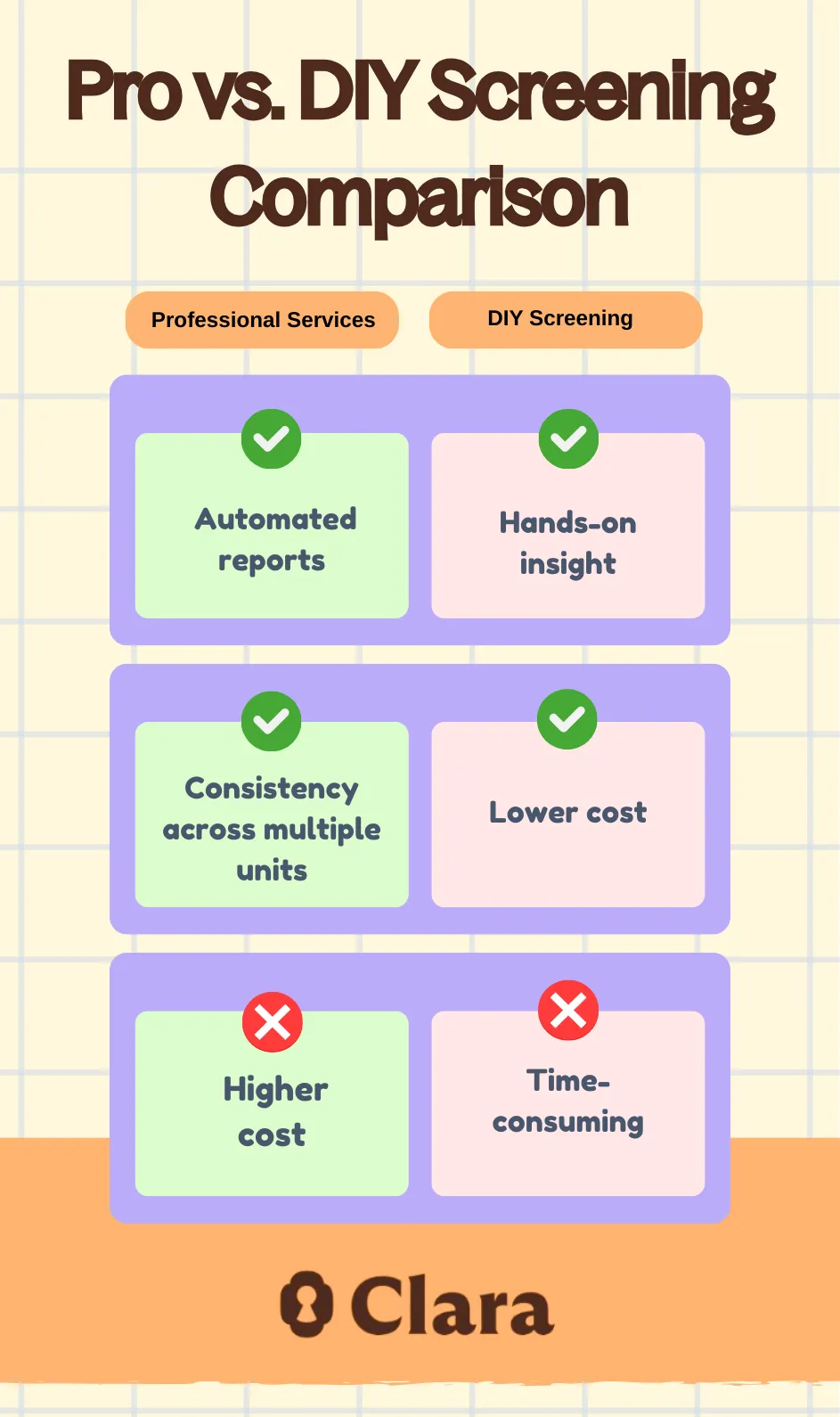.png)
A staggering 30% of landlords face issues with tenants, like late rent and property damage. It's key to have a good tenant screening process. This helps ensure reliable occupancy and timely rent payments.

A detailed tenant screening process helps you make smart choices. It lowers the chance of getting bad tenants. By using a solid screening method, you can keep your property safe and make renting successful. For more tips, check out the guide on tenant screening best practices.
"The most successful property managers understand that tenant screening isn't just a protective measure—it's the foundation of community building. When we shift our perspective from simply filtering out 'bad tenants' to thoughtfully selecting residents who will thrive in our specific properties, we transform the entire rental relationship. This subtle but profound mindset shift creates communities where residents feel chosen rather than merely accepted, fostering natural stewardship of the property and dramatically reducing the friction points that typically strain the landlord-tenant dynamic. True screening excellence isn't measured by who you keep out, but by the mutual success stories you create through intentional matching."
Taylor Wilson, CEO of Rent with Clara
Screening tenants well is key to avoiding financial losses for landlords. It's a crucial step for property managers and landlords to decide who to rent to.
Using a detailed screening process can lower risks for landlords. It safeguards their investment and fosters better landlord-tenant relationships.
Your rental property is a big investment. Keeping it safe is essential. A good screening process ensures your property is in good hands.
For example, a credit check can show a tenant's financial past. This helps you know if they'll pay rent on time and care for your property.
Finding tenants who pay on time is a main goal of screening. By looking at their rental history, job, and credit score, you can decide if they're reliable.
A quick guide on tenant screening says checking their job and income is key. This helps avoid late or missed payments.
High tenant turnover costs landlords a lot. It includes cleaning, repairs, and marketing to new tenants. Good screening can help keep tenants longer.
It also helps find tenants who won't damage your property. By looking at past evictions or damage reports, you can avoid problems.
In summary, tenant screening is crucial for property management success. It protects your investment, finds reliable tenants, and reduces damage and turnover. This leads to a more stable and profitable rental business.
As a real estate pro, it's crucial to have a solid tenant screening process. This process helps find reliable tenants and follows fair housing laws.
A standardized application process is key for effective tenant screening. It makes sure all applicants are treated the same and no important info is left out.
To make a detailed application, include:
Having a standard application helps streamline the screening and makes better decisions.
Objective and consistent screening criteria are vital for fairness and efficiency. They also meet legal standards, like fair housing laws.
Consider these factors when setting your criteria:
Clear criteria lead to unbiased decisions and lower the chance of disputes.
Pre-screening can cut down time on unsuitable applicants.
Techniques include:
By using these pre-screening methods, you can focus on the best applicants and make your screening process more efficient.
Landlords and property managers must decide whether to handle the entire tenant screening process themselves or utilize professional screening services to find the right tenant. Professional services can significantly expand your pool of potential tenants by providing comprehensive credit history reports and automated systems that streamline the screening workflow.
These services are particularly valuable for property owners managing multiple properties, as they ensure consistent evaluation criteria across every rental unit.
However, many successful landlords prefer a hands-on approach to better assess each applicant's rental payment history and ability to pay rent. A professional property manager often combines both methods, using automated services for initial screenings while personally verifying income and conducting reference calls.
This hybrid approach helps identify the ideal tenant while maintaining cost control and personal insight into each applicant's suitability.
The key is choosing an approach that consistently identifies tenants who are likely to pay rent on time and fulfill their lease agreement obligations. Whether you choose professional services or DIY methods, the goal remains the same: avoiding poor rental experiences by thoroughly evaluating each applicant's financial stability and rental history.

Getting to know a potential tenant is key. A thorough background check is essential. It helps property managers and landlords see if an applicant is reliable and trustworthy.
Checking a credit report is a big part of the background check. It shows their financial past, like their credit score and debts. A good credit score means they might pay rent on time.
When looking at credit reports, watch for:
Criminal background checks are also crucial. They reveal if someone has a criminal past that could be a risk.
When doing these checks, consider:
Checking a tenant's rental history and talking to past landlords is very helpful.
Ask about their:
It's important to check if a tenant has a steady job to pay rent.
Good ways to verify employment include:
By doing detailed background checks, property managers can make better choices. This helps avoid renting to tenants who might cause problems.
While employment verification confirms job status, landlords and property managers must go deeper to verify their income and assess true ability to pay rent. Requesting multiple months of pay stubs, bank statements, and tax returns provides a comprehensive view of an applicant's financial stability and helps predict their likelihood of making late or missed rent payments.
This thorough approach is essential for protecting your rental income and ensuring long-term tenancy success.
Smart property owners establish income requirements that typically range from 2.5 to 3 times the monthly rent, but verification goes beyond just meeting the minimum threshold. Examining an applicant's rental payment history through bank statements can reveal patterns of consistent payments or financial instability that might not appear in credit reports.
Additionally, documenting alternative income sources such as freelance work, government benefits, or investment returns ensures you're considering the applicant's complete financial picture when making your final lease agreement decision.
It's key for property managers to know about fair housing laws. These laws help make sure everyone is treated the same during the tenant screening. They aim to stop discrimination.
The Federal Fair Housing Act (FFHA) says you can't discriminate in housing based on race, color, and more. Property managers must make sure their screening is fair and unbiased.
Some important things to remember include:
Property managers also need to follow state fair housing laws. These laws can be different in each state and offer more protection.
For instance, some states protect against discrimination based on age, sexual orientation, or income source. It's important to know the laws in your state.
Keeping detailed records of the tenant screening is vital. It shows you follow fair housing laws. This includes the application process, what you look for, and why you approve or deny someone.
Having good records helps protect you from legal issues. It makes sure your screening is clear and fair.
Effective tenant screening is key for property management success. It helps you find tenants who pay on time and care for your property. A good screening strategy reduces turnover and damage, protecting your assets.
Follow the tips in this guide to create a solid application process. Set clear criteria and do thorough background checks. This way, you can pick responsible tenants and make smart rental choices.
A well-planned tenant screening process is vital for property managers. It helps you avoid risks and increase profits. By using these strategies, you can find reliable tenants, keep a steady income, and succeed in property management.